What are the Best Headphones for Listening to TV?
Which Wireless Headphones are Best for TV?
Wireless or Bluetooth Headphones for TV have become more and more common as we’re now spending more time at home; a pair of good TV Headphones gives you the ability to watch TV at the volume you like without disturbing others in your household.
For instance, if the parents are working while the kids are watching TV, a couple pairs of TV headphones would allow the kids to Enjoy TV without Disturbing the Parents, and the parents can have meetings without disturbing the kids (kids’ ears are covered by the headphones, duh!)
Oh, and in case you’re wondering… YES, it’s possible to connect two or more pairs of Wireless Headphones to one TV.
How to Connect Two Headphones to One TV?
How to Connect Three or More Pairs of Headphones to One TV?
A pair of TV headphones can also be the Perfect Companion for people with Hearing Loss; it essentially “gets the TV audio closer to your ears” so you can hear the TV audio better without having to turn the volume level way up.
So, How to choose Wireless Headphones for TV? What are the Best Headphones for Listening to TV? How can you tell the good ones from the not-so-good ones?
In this article, we’ll break down and walk you through the most important criteria for picking out a pair of Wireless or Bluetooth TV Headphones.
1. Things you Need to Know before Going out to Get One.
2. A little Bit about Audio Lag and How to Solve it.
3. What type of Audio Output Port does your TV Have?
4. What's your Hearing Condition?
5. What to Do if TV Doesn't Have Audio Output? What if I can't Reach the Audio Output Jack?
6. Form Factor: What Type of Headphones do you Like?
7. What about my Own Bluetooth/Wireless Headphones?
8. Can I Use Headphones and TV Speakers at the Same Time?
1) Things you Need to Know Beforehand – Does your TV have Built-in Bluetooth?
Before everything, you’d want to check if your TV has Bluetooth built-in or not. If you do, you can pretty much just take an existing pair of Bluetooth headphones and pair it to the TV directly.
If you don’t, you’ll need a Bluetooth Audio Adapter. Also, if you’d like to have the option to connect two or more pairs of headphones to the same TV, you’ll want a Bluetooth audio adapter as well; TV’s built-in Bluetooth can only handle one pair of headphones at a time.
2) A little Bit about Audio Lag and How to Fix it.
An important criterion when it comes to Wireless TV headphones is AUDIO LATENCY. Most wireless technologies will have some sort of audio lag, causing the visual and the audio to be off sync.
So, How Do I fix the Audio Delay on my Wireless Headphones you ask?
To “counter” this issue, TV Headphone manufacturer usually provide a Wireless Adapter alongside the TV headphone, this can more-or-less guarantee perfectly synchronized audio and visual when you use them.
Another thing you should know is that some Bluetooth TVs also come with a feature that can “adjust” or “correct” the audio synchronization when you connect a pair of Bluetooth headphones, so please be sure to check with your manufacturer before making a decision.
Either way, as mentioned above, we’d still recommend going with a Wireless (or Bluetooth) Adapter + Headphones Combo because:
a. It guarantees perfectly synchronized audio.
b. It usually gives you the ability to add at least another pair of headphones to it.
c. They’re usually more stable and easier to use than TV’s built-in Bluetooth.
Example of Headphones + Adapter Set:
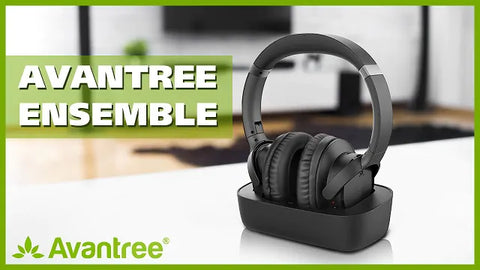
3) What type of Audio Output Port does your TV Have?
If you’re using a Wireless/Bluetooth Adapter for the headphones, the adapter will need to be plugged into your TV’s audio output port, so to make sure that you purchase a product that’s compatible with your TV, please check on your TV’s user manual and see which type of audio output port you have.
There are 4 main types of audio output ports:
-
a. HDMI ARC or eARC: All new TVs should have this; it provides the best audio quality compared to others. However, not a lot of Bluetooth/Wireless Audio Transmitter Adapters nowadays support ARC so you’ll likely have to go with another choice listed below.
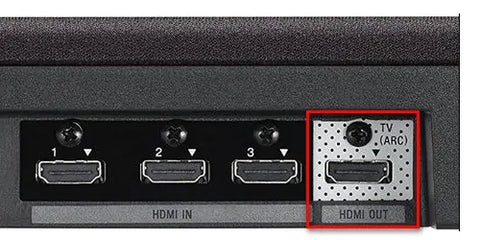
-
b. Digital Optical: Also known as SPDIF or TOSLINK, it is the most common type of TV audio output in the past 10 years. While the audio quality is far below ARC HDMI, it is still much better than everything else. Also, most Wireless TV Transmitters support this format.
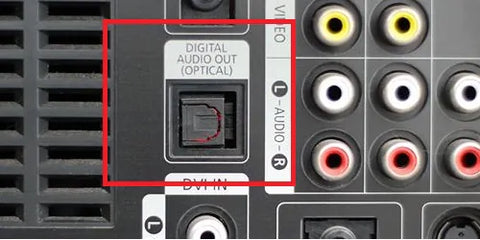
-
c. 3.5mm AUX: Usually labeled as “Headphones” jack. It is “Analog” format and is very common prior to the 2010s. The only downside is these are usually quite small and may take a while to find them. Most adapters support 3.5mm Auxiliary.
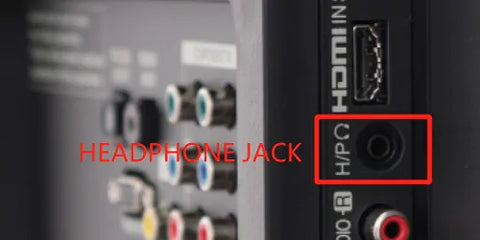
-
d. Red/White RCA: The oldest of all, comes with two pins; one for the left, the other for the right. Please note that ONLY THE PORTS LABELED “AUDIO OUT” CAN WORK; other RED/WHITE ports are only for input only and will not work. Most adapters also support this format.
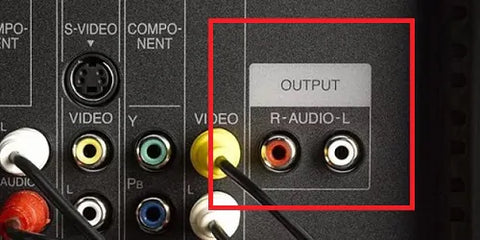
4) What's your Hearing Condition?
Are you hearing impaired? What's the degree of it?
There are various TV Headphones in the market that are Catered towards Hearing Impaired Patients; some headphones allow you to adjust the Equalizer (enhance bass or treble etc.), some allows Balance Adjustment (make one side louder than the other), and some are just... louder!
Don't hesitate to ask the manufacturer, they might have just the right product for you!
5) What to do If TV doesn’t Have Audio Output? What if I can’t Reach the Audio Output Jack?
Yup, this happens, especially with a lot of people deciding to hang their TVs on the wall to save space.
But not to worry, there are solutions for it.
If you have a TV Stick (such as Roku or Apple TV) or Cable Box inputting signal via HDMI into the TV, you can purchase an Audio Extractor to give the TV an “Extra Set of Audio Output Ports.”

If you don’t have a TV stick or cable box, you can go with a TV headphone set that comes with an “External Microphone.”
The external microphone can be attached to your TV’s speaker; it’ll take the audio in and transmit it to the headphones. We know it’s not the best solution, but it does work.
Products that come with this:
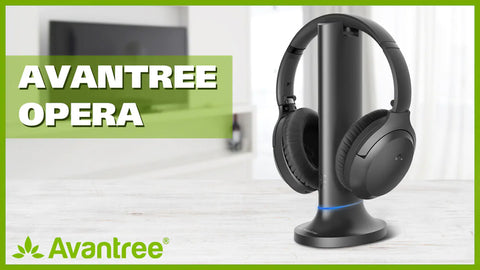
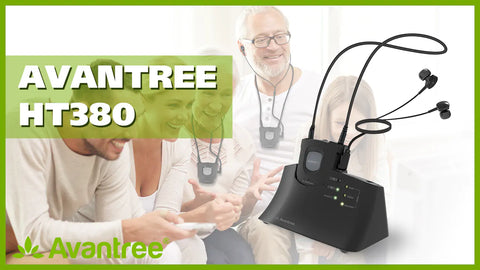
6) Form Factor - What Kind of Headphones do you Prefer?
If you’re using these for TV, you’ll most likely wear them for at least a few hours; therefore, it is important to pick one that’s going to be comfortably sitting on your head.
TV headphones come in a variety of shapes and forms; earbud style, over-the-ear style, neckband style etc. Try them out and pick the one that doesn’t irritate your ears.
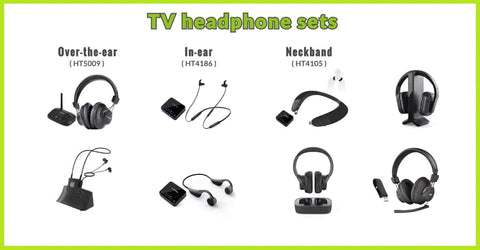
7) What about my Own Bluetooth/Wireless Headphones?
If you already own a pair of Bluetooth headphones, of course you can use them too. In that case, you’ll only need a Bluetooth Adapter for TV, like this:
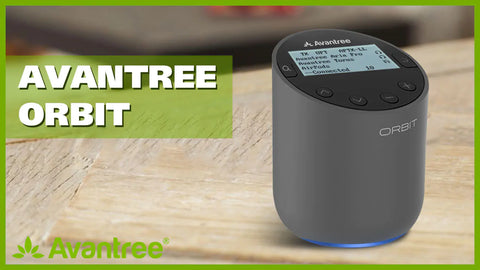
However, please note that most Bluetooth headphones do NOT come with low latency Bluetooth, so if you use them for watching TV, you may experience pretty bad audio lag.
If you’re going to use your own Bluetooth headphones, make sure that you get one that supports either aptX Low Latency or FastStream.
Here's a video that'll show you the Difference regarding Audio Lag:
8) Can I Use Headphones and TV Speakers at the Same Time?
Will my TV Speakers still Output Audio after I’ve plugged in the TV Headphones?
Good question. This depends on your TV; some TVs allow this, some don’t.
Our experience tells us that if you use the TV’s Digital Optical port as your Audio Output source, you’re more likely to have simultaneous audio through TV headphones.
We suggest that you plug something into the port to make sure; the Customer Support department of TV manufacturer are generally quite useless on this matter.
FAQs
Which wireless headphones are best for TV use?
The best wireless headphones for TV combine excellent sound quality, low audio latency, long battery life, and comfort. Top choices include the Sennheiser RS 195 RF for audiophile-grade sound and long range, and the Sennheiser RS 175 RF for budget-friendly comfort. Look for models with dedicated transmitters to ensure synced audio and video.
How do I avoid audio lag with wireless TV headphones?
Audio lag can cause sound and video to be out of sync. To fix this, choose headphones with low-latency codecs like aptX Low Latency or FastStream, often bundled with a compatible wireless transmitter. Using a headphone + adapter combo guarantees synchronized audio and allows connecting multiple headphones simultaneously.
What TV audio output ports are compatible with wireless headphones?
Wireless headphone adapters connect via your TV’s audio output ports. Common ports include HDMI ARC/eARC (best quality but less adapter support), Digital Optical (SPDIF/TOSLINK), 3.5mm AUX headphone jack, and Red/White RCA audio out. Check your TV’s manual to select an adapter compatible with your available ports.
Can I use my own Bluetooth headphones with my TV?
Yes, if your TV has built-in Bluetooth or you use a Bluetooth audio adapter. However, most Bluetooth headphones lack low-latency support, which may cause noticeable audio delay. For best results, use headphones supporting aptX Low Latency or FastStream and pair them with a compatible transmitter.
Is it possible to use headphones and TV speakers simultaneously?
Some TVs allow audio output through both headphones and speakers at the same time, but many do not. Using the TV’s Digital Optical output increases the chances of simultaneous audio. Test your TV’s settings or consult the manual, as this feature varies by model and manufacturer.
For more detailed info regarding this topic, please see:
How to Have Audio Played through my Headphones AND my TV Speaker at the Same Time?
With the current work-from-home environment, a pair of Wireless Headphones for TV Watching may JUST BE the PERFECT SOLUTION for a lot of issues you encounter at home.
Please feel free to leave your questions & comments in the section below or send us an email at support@avantree.com, we’ll do our best to help.
Thank you and Stay Safe.
